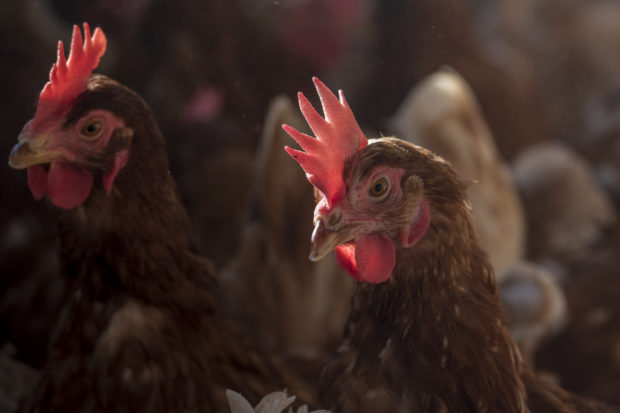On the heels of the resounding affirmation of Question 3 by voters in Massachusetts – which stops not just extreme confinement of farm animals but also the sale of animal products from factory farms that employ those methods – the nation’s biggest federal appellate court rejected an effort by six ag-state attorneys general and governors to block enforcement of one of California’s key food-safety and anti-confinement laws (AB 1437). Question 3 includes provisions modeled after A.B. 1437, but the Massachusetts ballot measure also includes a ban on the sale of pork and veal from factory farms that use tight crates. The court found that Missouri Attorney General Chris Koster and five other state attorneys general and governors who brought the case do not have standing to sue over the law because they were really acting on behalf of a handful of egg corporations rather than the citizens of their states.

The court found that Missouri Attorney General Chris Koster and five other state attorneys general and governors who brought the case do not have standing to sue because they were really acting on behalf of a handful of egg corporations rather than the citizens of their states. Photo by David Paul Morris/For The HSUS
Koster lost his bid for Missouri governor, even though he won the endorsement of the Missouri Farm Bureau and other animal agriculture commodity groups during his race. Oklahoma Attorney General Scott Pruitt was also a plaintiff in the case against California, and he, too, too was on the losing side of a key race in his state: Oklahoma voters handily defeated State Question 777 and rejected an effort to create a constitutional “right to farm” and to give special rights to some farmers in the Sooner State.
In the Ninth Circuit case, the court determined that speculative harm to a few producers wasn’t nearly enough to bring a case in the name of the entire states, and that far from harming citizens, the law might even “benefit consumers.” This suggests that our humane ballot initiatives and laws, dealing with production practices and the sale of animal products from extreme confinement operations, are constitutionally sound.
In 2008, nearly two-thirds of voters supported Proposition 2, which sought to allow laying hens, breeding sows, and veal calves to “stand up, lie down, turn around, and freely extend their limbs.” As a follow up, in 2010, state lawmakers enacted AB 1437, authored by Congressman Jared Huffman when he was in the California Assembly, which stipulated that shell eggs sold in California must come from hens in housing systems compliant with Proposition 2.
Both laws went into effect on January 1, 2015. Like the 78 percent of voters who overwhelmingly passed Question 3 in Massachusetts last week, California voters and the lawmakers, in passing Prop 2 and AB 1437, sent an unmistakable message that states retain the authority to prevent cruelty and reduce food safety risks. Proposition 2 has already been upheld against three separate challenges in state and federal court, from egg companies who want to keep hens jammed in cages so tightly that they can barely move.
Koster’s lawsuit was an effort to force California food retailers to sell eggs from factory farms in other states, no matter how inhumane or unsafe they might be. It sought to achieve the same goal as an amendment offered a couple of years ago in Congress by U.S. Rep. Steve King, R-Iowa, to invalidate state laws to help animals and to put the federal government entirely in charge of agricultural rules. What Koster and King know so well is that there are essentially no federal laws to protect farm animals, and through their different channels, they were seeking to deregulate animal agriculture – the same goal that the backers of the failed State Question 777 had in Oklahoma.
The court found that the states’ “allegations [were] inconsistent” and that, according to some of them, egg prices would actually fall in the Midwest, which would mean “no ill effects for egg consumers would come to pass.” Importantly, the court also found that AB 1437 “do[es] not distinguish among eggs based on their state of origin” and therefore “is not discriminatory.” In other words, “California egg farmers are subject to the same rules as egg farmers from all other states, including California itself.” If you are a producer who wants to sell eggs in California, you’re going to have to ensure that the birds can move freely, because the people of California have spoken.
This likely spells the end of Koster’s theory that the law unlawfully discriminates against out-of-state egg producers. Kudos to California Attorney General Kamala Harris, who was elected as California’s new U.S. senator last week, and to her team for their successful defense. With the defeat of Question 777 in Oklahoma and the passage of Question 3 in Massachusetts, we’ve struck three big blows against intensive confinement agriculture and affirmed the rights of states to properly and rationally regulate agricultural and commercial activities.
Today’s ruling reaffirms a 2014 lower court opinion, and sends the case back to the lower court with instructions to dismiss it without prejudice. The HSUS intervened in the lawsuit and our Animal Protection Litigation team joined with pro bono attorneys from Latham and Watkins and Schiff Hardin to defend the law alongside California.
The post Federal appeals court tosses challenge to landmark California farm animal protection law appeared first on A Humane Nation.
Enviroshop is maintained by dedicated NetSys Interactive Inc. owners & employees who generously contribute their time to maintenance & editing, web design, custom programming, & website hosting for Enviroshop.
